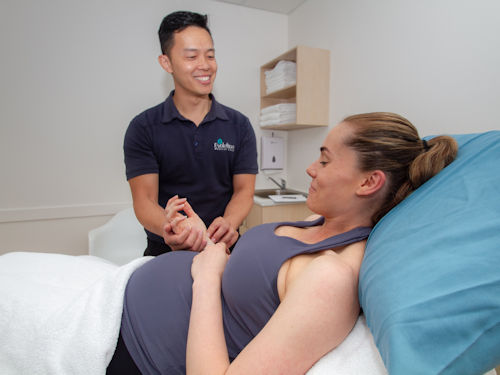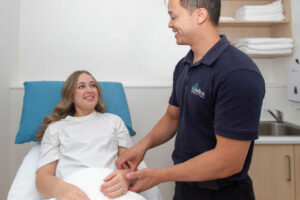With an increasing frequency of older first-time parents, it’s understandable that many couples are increasingly looking to improve their fertility outcomes and achieve successful pregnancies.
When it comes to fertility, there are many ways to improve outcomes.
It is important to pay attention to the fundamentals of good health:
- Appropriate rest
- Exercise
- Diet
- Avoiding harmful substances
- Reducing stress which is associated with a two-fold increase in infertility
Infertility can be due to either poor health on the male or female’s part with most of the focus placed on the female due to the female being significantly more involved in fertility and subsequent pregnancy.
What Causes Infertility In Women?
Infertility is identified as being an inability to fall pregnant for more than 12 months.
Diagnosing why a woman can’t get pregnant can be a sensitive and challenging subject. There are various treatments available to assist with conceiving, which will depend on the cause of infertility.
Assessing Infertility In Women
Fertility tests may include:
- Ovulation Testing
Which may include either at-home testing or blood tests to assess hormones that indicate ovulation is happening
- Ovarian Reserve Testing
Usually conducted on infertile women older than 35 to assess the quality and quantity of eggs available for ovulation
- Blood Tests
To assess other hormone levels for ovulation as well as thyroid and pituitary systems
- Imaging Tests
Which may include ultrasound/X-ray scanning
- Laparoscopy
Which involves small incisions beneath the navel to insert a thin viewing camera to assess ovaries, fallopian tubes and uterus to assess for scarring, endometriosis, blockages or irregularities of the fallopian tubes and problems with the ovaries and uterus.
Conditions Causing Infertility In Females

Some of the most common reasons or conditions why some women are unable to conceive are as follows:
- Ovulation Disorders
Ovulation disorders affect the release of eggs from the ovaries. Ovulation disorders include PCOS.
- PCOS
Polycystic ovary syndrome is a hormone imbalance which affects ovulation. Women with PCOS produce more significant amounts of male hormones, which results in irregular menstrual periods, making it harder to get pregnant.
- Endometriosis
Endometriosis is a painful disorder which occurs when the tissue that usually lines the inside of your uterus grows outside of the uterus. Endometriosis also involves your ovaries, fallopian tubes and the tissue lining your pelvis. To get pregnant, an egg must be released from an ovary, but endometriosis obstructs the egg from leaving the ovary. Individuals with mild to moderate endometriosis can still conceive and have babies.
- Fallopian Tube Damage
This is often caused by inflammation or damage of the fallopian tube. This can occur from pelvic inflammatory disease, sexually transmitted infections or endometriosis.
- Cancer
Certain cancers and the treatment involved, such as radiation and chemotherapy, can impair female fertility.
- Age
A woman’s fertility slowly declines with age. Infertility in older women, typically over the age of 37, maybe due to the number and quality of eggs.
What Causes Infertility In Men?
These may include:
- Abnormal Sperm Production Or Function
This may be due to many different reasons such as undescended testicles, genetic defects or infections such as chlamydia.
- Health Problems
Health problems which can affect fertility can include things such as high blood pressure, hormones, diabetes or depression. Smoking cigarettes frequently, drinking alcohol, consuming marijuana or taking medications to treat bacterial infections can also affect fertility.
- Emotional Stress
Stress can interfere with certain hormones needed to produce sperm. Things such as depression or common stress can affect sperm count.
- Overexposure To Certain Environmental Factors
These can include things like pesticides and radiation. Frequent exposure to heat, such as in saunas, hot tubs, or even working all day outdoors on a sunny day can raise body temperature and may affect sperm production.
- Damage Related To Cancer And Its Treatment
Radiation or chemotherapy treatment for cancer can impair sperm production, sometimes severely.
Assessing Infertility In Men

Diagnosing male infertility problems usually involves:
- General Physical Examination And Medical History
Examining the genitals and finding out about any inherited conditions, chronic health problems, illnesses, injuries or surgeries that could affect fertility.
- Semen Analysis
A sample may be obtained by masturbating and ejaculating into a special container at the doctor’s office, which will then be examined by professionals.
- Genetic Tests
A blood test can reveal whether there are subtle changes in the Y chromosome (signs of a genetic abnormality).
- Hormone Testing
A blood test can determine the level of testosterone and other hormones in the male’s body. These hormones play a key role in sexual development and sperm production.
Treatments To Improve Fertility Outcomes
Remember, infertility is deemed as an inability to conceive for more than 12 months. Before this time, it may well be just a matter of getting the timing of intercourse right or other incidental factors that affect fertility outcomes and shouldn’t be taken too seriously.
If infertility is an issue after 12 months of trying, and the patient wants to improve outcomes to fall pregnant successfully, there are various lifestyle modifications and treatments to undertake to improve results.
Lifestyle Modifications To Boost Fertility:
- Use an ovulation calendar to track optimum intercourse periods
- Try an ovulation kit
- Eat a well-balanced diet and stay hydrated
- Exercise regularly
- Cut caffeine, alcohol and cigarettes
- Manage stress
- Try a Multivitamin
- Increase Your Iron Intake
- Get enough sleep
Medical Treatments To Improve Fertility
Various treatments may be employed to improve fertility outcomes from a medical perspective. Your general practitioner should be your starting point when seeking out professional medical services.
Your general practitioner will take your case history, request tests if necessary and possibly refer you on to a specialist doctor called an Obstetrician (A doctor that specialises in pregnancy, childbirth, and a woman’s reproductive system).
How Does Acupuncture Assist Infertility?
When it comes to acupuncture and fertility research, the focus has been placed on acupuncture in combination with IVF to achieve optimum results. With the advance of technology, IVF has helped thousands of couples conceive and carry pregnancies to term even in situations where natural pregnancies are not an option.
Acupuncture stimulates the autonomic nervous system, which:
- Decreases anxiety associated with stress, and
- Stimulates the brain to regulate hormones that are necessary to facilitate conception and successful pregnancy. These include FSH (follicle-stimulating hormone), LH (luteinising hormone), progesterone, oestrogen, prolactin and oxytocin
What Research has shown about acupuncture & IVF
- 2-3 sessions provide significant IVF-related anxiety and stress reduction
- Acupuncture improves clinical outcomes of subsequent IVF cycles among women who have experienced recurrent failures
How Often Should Acupuncture Be Used To Improve Fertility?
Treatment frequency recommended varies depending on the cause of infertility. Our practitioners will assess the state of health and be able to advise an appropriate treatment protocol based on their clinical experience and scientific research.
When it comes to IVF, established treatment protocols recommend that acupuncture treatment should be undertaken up to 3 months before transfer. Studies show that an average of 13-14 sessions is associated with significantly more live births.

What Should You Expect When Getting Acupuncture For Pregnancy?
Once you’ve walked into the consultation room and been made comfortable, the practitioner will inquire about medical history and start by asking questions relating to overall health.
Some of these questions may seem daunting such as “do you get headaches regularly?” or “do you grind your teeth?”. The practitioner is gathering broad information at this stage to understand the overall state of health. These questions are essential to develop appropriate treatment protocols and maximise outcomes from treatment.
If the questioning process reveals inadequate information, the practitioner might feel your pulse and observe the tongue. For a TCM (Traditional Chinese Medicine) practitioner, the tongue and pulse provide valuable information as to what is happening inside the body.
The practitioner may feel the need to ask a few more questions to finalise the diagnosis; when all is done, the treatment begins!
Are There Alternatives To Needles?
Yes. At Evolution Medical Care, non-invasive treatments include:
- Acupressure
- Cupping
- Moxibustion
- Massage
- Auriculotherapy (ear stimulation)
Is Acupuncture Safe During Pregnancy?
Yes. Acupuncture is very safe, not only for pregnancy but many other conditions as well[8].
What About Herbal Medicines?
Herbal medications are regularly used to improve the outcomes of natural fertility treatment. If there is a need for this, your practitioner will discuss this with you in your initial consultation.
Due to possible adverse reactions between IVF medications and herbal medications, Evolution Medical Care does not prescribe herbal medicines for IVF patients. Instead, we recommend regulatory treatments as listed above, which are completely safe during IVF and pregnancy.





